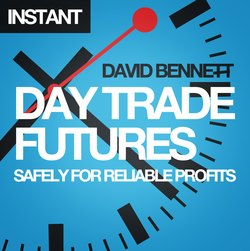Оглавление
David Bennett. Day Trade Futures Safely For Reliable Profits
Publishing details
Preface
Chapter One: The Way I Trade. Different traders, different approaches
Why futures?
Why day trade?
Automation to defeat addiction
Chapter Two: Planning. Shortcut to penury
What’s in a plan?
Guiding principles
Automate for perfection
Planning template
Simulation
Chapter Three: Trading Style. Introduction
General approach
A typical trading session
Entry types
Aggressive entry
Normal entry
Defensive entry
Difference between the normal and defensive entries
Risk management
Placing a stop loss
Calculating the risk per trade
Calculating the trade size in terms of contracts
Money management
Two cautions
The asymmetric effect
Trading a large number of contracts
Trade management
The stop loss
End of session exit
The target order
The close trail
The loose trail
Trading style is NOT a black box
Chapter Four: Details of the Trading Plan. Introduction
The trend
Time to start trading
Charting time frame
Period to continue the search
Type of trend bias
The pullback
The entry
Risk/reward
Trade management
Chapter Five: Researching Optimal Strategy Settings. The best time for analysis
What I analyse
The simulator
The simulator input form
The simulator results
The design process
Example
Simulate it!
Chapter Six: Traps for Unwary Traders. Costs can kill
Commissions and exchange fees
Slippage – the silent killer
Don’t day trade
Use limit orders
Smarter entries
Where an offset is involved
Conclusion
Curve fitting
How to counteract curve fitting
Chapter Seven: Last thoughts. Not typical day trading
Where are the indicators?
Good Luck!
Отрывок из книги
When I talk about day traders I think of them falling into two main camps – intuitive traders and system traders.
If you watch markets long enough (some people watch every tick for years), you begin to get a feel for what is about to happen. If you enter and exit trades based on this feeling, you are an intuitive trader. Some of the most successful traders are intuitive and we can only envy their talent and skill.
.....
The third reason I am a day trader is that I hate worrying about work at night and at weekends. That’s family time. As a day trader, I hold no positions at the end of each and every trading day, so there is nothing to worry about during my leisure time.
I have traded daily since I retired from my corporate career in 1998. For about half that time I traded manually at my computer, making trading decisions in real time. It was exciting, tiring and psychologically draining.
.....
